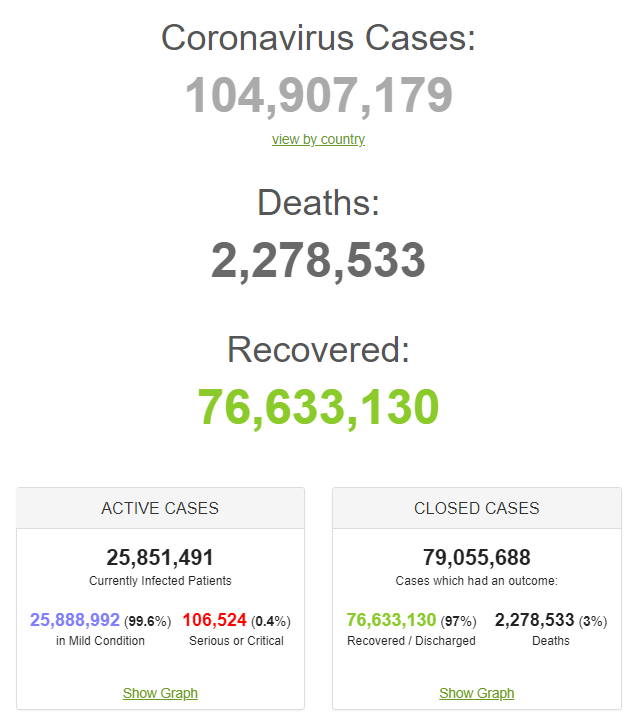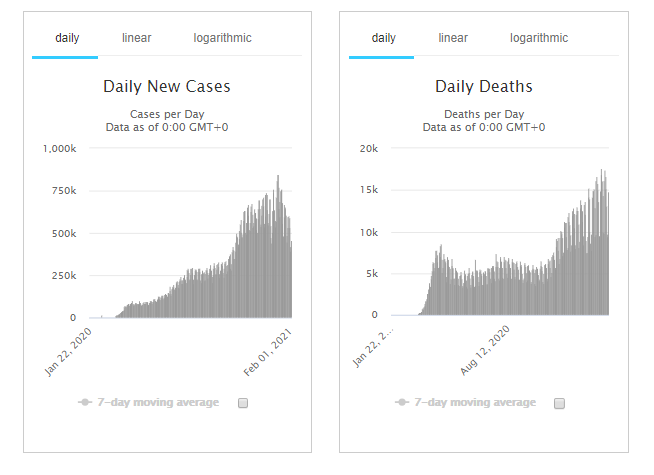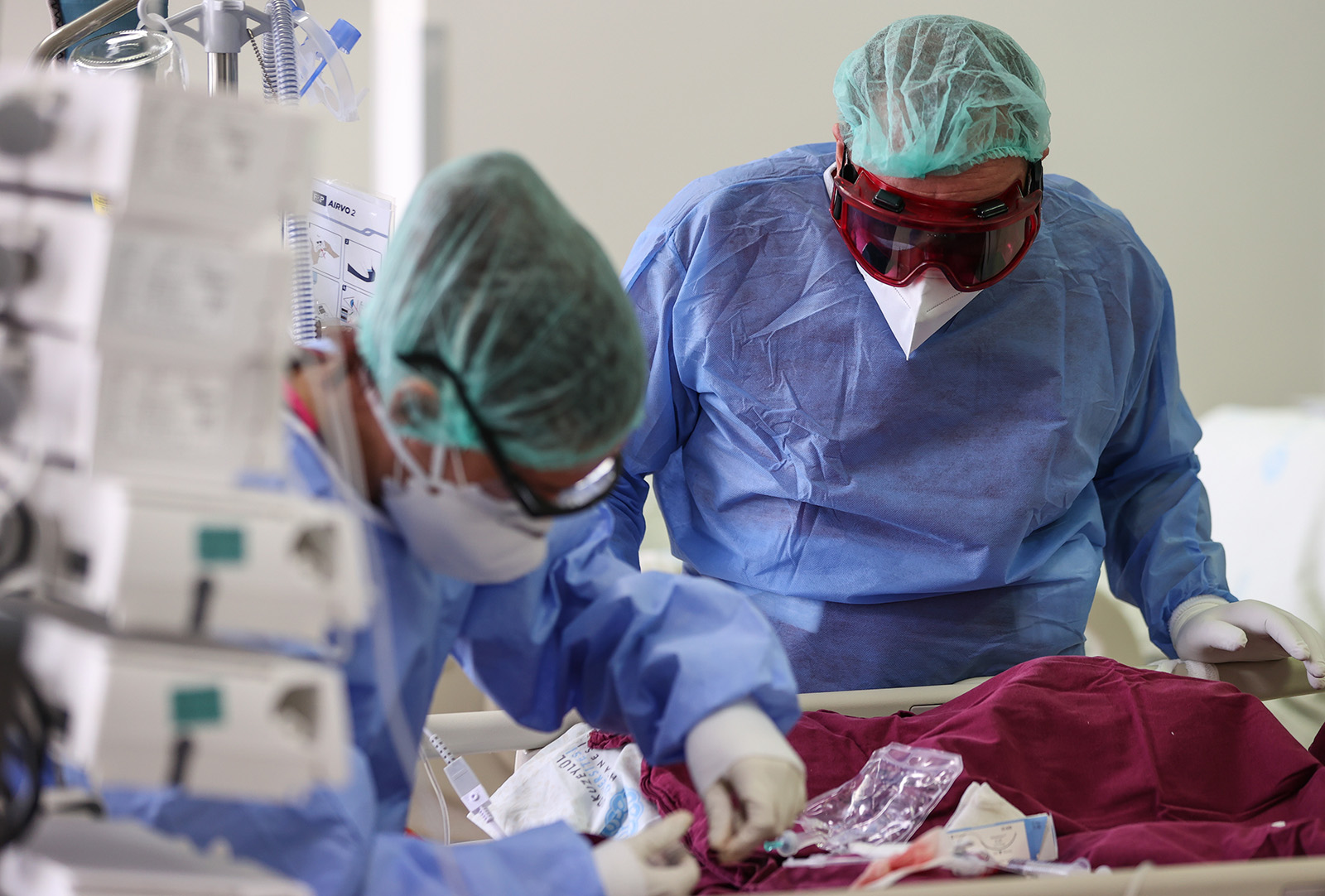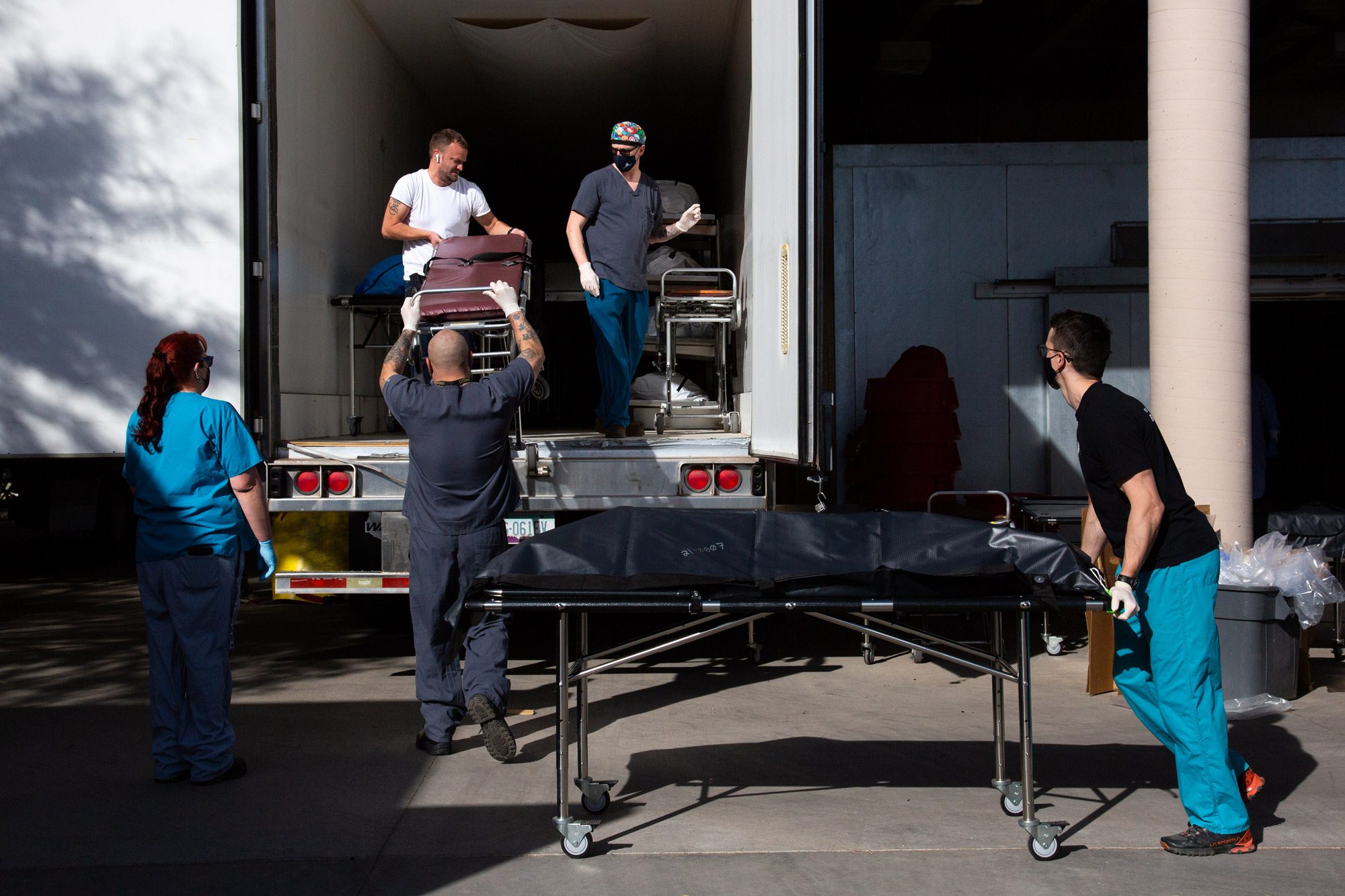
 i_need_contribute
i_need_contribute



|
Country, |
Total |
New |
Total |
|
World |
104,888,472 |
+489,196 |
2,276,781 |
|
27,150,457 |
+113,459 |
461,930 |
|
|
10,791,123 |
+12,917 |
154,742 |
|
|
9,339,921 |
+53,665 |
227,592 |
|
|
3,901,204 |
+16,474 |
74,684 |
|
|
3,871,825 |
+19,202 |
109,335 |
|
|
3,251,160 |
+26,362 |
77,595 |
|
|
2,913,389 |
+31,596 |
60,370 |
|
|
2,583,790 |
+13,189 |
89,820 |
|
|
2,501,079 |
+8,102 |
26,354 |
|
|
2,252,489 |
+12,521 |
60,212 |
|
|
2,125,622 |
+11,025 |
54,877 |
|
|
1,952,744 |
+9,196 |
48,539 |
|
|
1,874,092 |
+4,384 |
159,533 |
|
|
1,527,016 |
+6,802 |
37,897 |
|
|
1,463,016 |
+4,058 |
45,344 |
|
|
1,438,286 |
+6,870 |
58,189 |
|
|
1,227,164 |
+3,285 |
23,089 |
|
|
1,158,337 |
+8,573 |
41,538 |
|
|
1,111,671 |
+11,984 |
30,770 |
|
|
1,003,785 |
+9,133 |
16,758 |
|
|
989,237 |
+4,013 |
14,169 |
|
|
789,651 |
+3,231 |
20,355 |
|
|
740,944 |
+9,083 |
13,257 |
|
|
736,645 |
+2,610 |
18,576 |
|
|
735,484 |
+2,752 |
18,600 |
|
|
713,271 |
+1,854 |
21,173 |
|
|
668,874 |
+8,896 |
4,948 |
|
|
623,072 |
+1,317 |
13,079 |
|
|
549,032 |
+1,384 |
11,802 |
|
|
536,545 |
+438 |
8,162 |
|
|
530,118 |
+1,266 |
10,942 |
|
|
473,047 |
+774 |
8,323 |
|
|
418,283 |
+1,520 |
7,902 |
|
|
400,837 |
+1,932 |
4,071 |
|
|
393,836 |
+2,210 |
5,912 |
|
|
370,336 |
+1,048 |
12,739 |
|
|
368,945 |
+306 |
6,386 |
|
|
330,474 |
+1,280 |
4,344 |
|
|
323,382 |
+1,181 |
5,366 |
|
|
313,626 |
+3,977 |
878 |
|
|
309,162 |
+3,320 |
3,315 |
|
|
271,431 |
+142 |
2,031 |
|
|
259,897 |
+688 |
3,221 |
|
|
254,826 |
+2,732 |
4,889 |
|
|
252,390 |
+1,111 |
14,949 |
|
|
251,705 |
+1,711 |
1,746 |
|
|
233,637 |
+730 |
5,088 |
|
|
230,617 |
+162 |
3,145 |
|
|
226,912 |
+4,284 |
809 |
|
|
221,266 |
+719 |
9,218 |
|
|
220,426 |
+2,127 |
10,513 |
|
|
217,277 |
+1,357 |
2,719 |
|
|
212,679 |
+1,267 |
6,980 |
|
|
199,782 |
+425 |
2,170 |
|
|
199,430 |
+1,006 |
3,512 |
|
|
195,537 |
+528 |
2,650 |
|
|
190,359 |
+1,228 |
2,476 |
|
|
184,208 |
+760 |
2,867 |
|
|
170,101 |
+1,615 |
3,564 |
|
|
167,525 |
+512 |
9,460 |
|
|
167,421 |
+190 |
3,096 |
|
|
167,410 |
+756 |
961 |
|
|
161,642 |
+917 |
3,480 |
|
|
160,966 |
+667 |
5,736 |
|
|
160,426 |
+470 |
1,857 |
|
|
159,866 |
+1,150 |
5,878 |
|
|
152,491 |
+396 |
249 |
|
|
149,790 |
+839 |
3,638 |
|
|
140,927 |
+263 |
3,160 |
|
|
139,408 |
+547 |
2,122 |
|
|
135,229 |
+747 |
2,765 |
|
|
134,856 |
+171 |
1,532 |
|
|
134,690 |
+1,138 |
1,618 |
|
|
128,315 |
+563 |
1,209 |
|
|
121,243 |
+809 |
1,914 |
|
|
108,116 |
+275 |
2,900 |
|
|
104,792 |
+553 |
376 |
|
|
101,159 |
+150 |
1,769 |
|
|
93,510 |
+350 |
2,893 |
|
|
89,619 |
+25 |
4,636 |
|
|
84,762 |
+116 |
1,415 |
|
|
80,941 |
+1,007 |
1,404 |
|
|
79,311 |
+467 |
1,441 |
|
|
78,859 |
+58 |
621 |
|
|
68,658 |
+1,231 |
1,250 |
|
|
68,559 |
+777 |
433 |
|
|
8,556 |
+59 |
156 |
|
|
7,083 |
+55 |
61 |
|
|
1,911 |
+29 |
35 |
Retrieved from: https://www.worldometers.info/coronavirus/
From CNN's Isil Sariyuce in Istanbul

Intensive care health workers treat a Covid-19 patient at Dokuz Eylul University (DEU) Research and Application Hospital in Izmir, Turkey on January 29. Mahmut Serdar Alakus/Anadolu Agency via Getty Images
Two people in Turkey have contracted the Covid-19 variant first seen in South Africa, and one patient has been identified with the variant first seen in Brazil, Turkish health minister Fahrettin Koca said on Wednesday, according to state news agency Anadolu.
"Risky mutations spread without boundaries. The (numbers of cases of the) UK mutation in our country now stands at 196. Two cases of the South African variant and one case of the Brazilian variant were (also) encountered. These days, when new mutations are seen and cases are on the rise again, we will continue our struggle without compromising on measures," Koca said on Twitter.
Turkey suspended flights from Brazil, Denmark, and South Africa in late January due to the new strains of coronavirus.
The Turkish Health Ministry announced 8,102 new Covid-19 infections and 117 additional deaths on Wednesday, bringing the national total to 2,501,079 cases and 26,354 fatalities.
About 2.4 million people have had their first dose of vaccinations, according to the ministry. After additional safety tests, phase 2 will begin, with the vaccination of citizens aged over 65.
Turkey is administering the Sinovac vaccine from China, in a deal that's expected to eventually supply 50 million doses.
From CNN’s Christopher Rios
The United Kingdom is launching the world’s first study examining whether different coronavirus vaccines can safely be used for two-dose regimens.
Participants in the study will be given the vaccine in alternating doses -- for example, Oxford/AstraZeneca for the first dose and Pfizer/BioNTech for the second.
“If we do show that these vaccines can be used interchangeably in the same schedule this will greatly increase the flexibility of vaccine delivery, and could provide clue as to how to increase the breadth of protection against new virus strains,” said Matthew Snape, chief investigator and associate professor in vaccinology at the University of Oxford.
Enrollment in the UK government-funded study is currently underway and preliminary results are expected over the summer.
The current vaccine dosing regimen for the general public will remain unchanged in the UK. But if the study shows promising results, the government may consider revising the recommended vaccine regimen.
“Nothing will be approved for use more widely than the study, or as part of our vaccine deployment program, until researchers and the regulator are absolutely confident the approach is safe and effective” said minister of Covid-19 vaccine development Nadhim Zahawi.
Currently, the US Centers for Disease Control and Prevention and the World Health Organization do not recommend interchanging coronavirus vaccines, since there is no data available that examines whether doing so would still provide the same level of protection.
From CNN’s Haley Brink

Employees move bodies into refrigerated semi-trucks at the Pima County Office of the Medical Examiner on January 14 in Tucson, Arizona. Courtney Pedroza/Getty Images
There have been at least 450,088 reported deaths from Covid-19 in the United States since the pandemic began, according to data compiled by Johns Hopkins University.
There have been at least 26,533,999 total coronavirus cases in the US, university data showed.
Johns Hopkins recorded the first death from Covid-19 on Feb. 29 in Washington state. Later in the spring, two earlier deaths in California were posthumously confirmed to be from Covid-19.
There are four other countries in the world that have reported over 100,000 total Covid-19 deaths, according to the university. Brazil has more than 200,000 total deaths while Mexico, India, and the United Kingdom have over 100,000.
https://edition.cnn.com/world/live-news/coronavirus-pandemic-vaccine-updates-02-03-21/index.html
Tennis officials on Thursday postponed the Australian Open draw by a day after a worker in one of the hotels where players have been quarantining tested positive for Covid-19.
The positive PCR test, which came days after some players began to emerge from quarantine, forced 507 players and support staff members into isolation until they receive negative test results. Tennis officials have called off matches planned for Thursday in several tuneup events, but they said the Australian Open would move forward with its scheduled Monday start.
News of the positive test sent chills through Melbourne, the tournament’s host city, whose citizens endured a lockdown of nearly four months last year.
“We have all been through a tough time,” said Craig Tiley, the chief executive of Tennis Australia, which runs the Australian Open. “At some point we need to continue on.”
Officials still plan to allow as many as 30,000 spectators each day at the tournament, a rarity in international sports with the pandemic still raging.
Melbourne, the capital of the state of Victoria, had not recorded a local transmission in nearly a month. The man who tested positive worked at the Grand Hyatt in downtown Melbourne, where some players are still staying. He has not worked there since Jan. 29.
The man’s closest contacts have been tested, and officials have released details of his travels in recent days. He had been working on the same floor where several of the people who tested positive for Covid-19 when they arrived in Melbourne had been staying.
Victoria’s premier, Daniel Andrews, has been criticized for allowing the tournament to go ahead. On Wednesday night, he reintroduced a series of restrictions, including mandatory mask-wearing indoors and a limit of 15 visitors to private homes. He also postponed a planned increase in workplace capacity to 75 percent from 50 percent.
Those measures were less severe than other recent responses to Covid-19 in Australia. The city of Perth, in Western Australia, snapped into a total lockdown on Sunday after health officials discovered a single local transmission. That lockdown is expected to last at least five days.
The Australian Open’s attempt to quarantine players for 14 days and hold four weeks of tennis events has had no shortage of hiccups. Last month, 72 players were forced into a hard lockdown, preventing them from practicing, after 10 people on three flights that brought people from overseas for the tournament tested positive. A handful of those players were at Grand Hyatt, and they went back into isolation on Thursday.
Some players who continued to test negative through their strict lockdowns were furious that health officials had refused to allow exceptions to the isolation requirement for everyone considered a close contact of a Covid-19 case.
“The players have been remarkable,” Mr. Tiley said. “They have come to accept that with travel round the world anything can happen.”
In a news conference after his match Wednesday night, Nick Kyrgios, a veteran player from Australia, said that other players had no right to complain about coronavirus precautions at the tournament.
“There’s too much risk in all of this,” Mr. Kyrgios said. “I don’t understand what’s so hard for tennis players to understand.”
Retrieved from: https://www.nytimes.com/live/2021/02/03/world/covid-19-coronavirus/a-new-case-complicates-logistics-at-the-australian-open

The Tokyo Olympics organizers released a booklet on staying safe during the games.Credit...Pool photo by Du Xiaoyi
No cheering, singing or handshakes. And no riding public transportation without special permission.
After nearly two months of relative silence amid new waves of coronavirus infection in Japan and many other countries, organizers of this summer’s Tokyo Olympics on Wednesday released the first of several so-called playbooks that will instruct athletes, officials and members of the news media on the protocols they must follow at this summer’s rescheduled Games.
But at only 32 pages, and conspicuously light on details, the document may do little to assuage the concerns of those who question whether the Olympics can proceed safely amid a pandemic. And the raft of questions left unanswered in its colorfully illustrated pages highlights just how many complicated feats of logistical planning and execution remain ahead for organizers of the world’s largest sporting event.
“If you have been to the Games before, we know this experience will be different in a number of ways,” reads the booklet’s introduction. “For all Games participants, there will be some conditions and constraints that will require your flexibility and understanding.”
That might prove a huge understatement.
Already delayed once by a year, the opening ceremony is now 170 days away. Between now and then, organizers must find a way to accommodate and ensure the safety of more than 10,000 athletes (as well as thousands of coaches, staff members and journalists) who view this summer as the culmination of years of sacrifice and training.
They also must win back the support of an increasingly skeptical Japanese public, all against the fast-changing backdrop of cases, vaccinations and changing global health protocols.
If the Games do open as scheduled on July 23, then the organizers will be right on one point: They will be very different from any previous edition.

Workers at a Serum Institute of India vaccine plant in Pune, India, packed trays of the AstraZeneca-Oxford vaccine in January.Credit...Atul Loke for The New York Times
An international program to supply Covid-19 vaccines at low or no cost to countries around the world plans to deliver more than 300 million doses by June 30, it said on Wednesday.
But even with that help, many of the world’s poorest countries are likely to lag far behind in vaccinating their citizens, and may not be able to mount any large-scale effort this year.
Scientists say that could leave the entire world, even people in widely vaccinated countries, more vulnerable, at a time when worrisome new variants of the virus are cropping up and spreading worldwide.
The assistance program, known as Covax, was set up by international organizations to try to counteract “vaccine nationalism” and ensure that the scramble for vaccines among rich countries did not leave poorer nations out in the cold.
Covax said on Wednesday that it hoped to ship 336 million doses of the AstraZeneca-Oxford vaccine to 145 countries in the first half of the year, with shipments to begin late this month or early in March. The vaccine deliveries would be among the first to reach low- and middle-income countries.
Some 96 million of the doses would come directly from AstraZeneca, Covax said, and the rest from the Serum Institute of India. The program said that close to 100 million doses of the total would be delivered by the end of March.
Covax cautioned that its figures and delivery dates were “indicative” estimates, based on what manufacturers had said would be available. Production hiccups and other problems could result in lower deliveries.
In addition to the AstraZeneca doses, Covax plans to supply a much smaller number, around 1.2 million, of the Pfizer-BioNTech vaccine in the first quarter of the year, according to Seth Berkley, chief executive of the GAVI Alliance, the organization that leads the Covax program.
The Pfizer-BioNTech vaccine requires storage at extremely cold temperatures, so those shipments will go to just 18 countries, selected for their ability to meet those requirements. By the end of the year, Covax expects to ship 40 million doses of the Pfizer-BioNTech vaccine.
Along with the GAVI Alliance, the partners in the Covax program include the World Health Organization, Unicef and the Coalition for Epidemic Preparedness Innovations. Covax has raised pledges of $6 billion, including $4 billion from the United States, with a goal of supplying up to 2 billion doses to low- and middle-income nations by the end of 2021.
The executive director of Unicef, Henrietta Fore, said on Wednesday that Unicef had reached a long-term agreement on Covax’s behalf with the Serum Institute of India for up to 1.1 billion doses of the AstraZeneca-Oxford vaccine and one developed by Novavax. The agreement, which extends beyond 2021, would supply vaccine to around 100 low-and middle-income countries for about $3 a dose.
“This is a great value for Covax donors,” she said, showing how the program “can negotiate in bulk for the best possible deals.”
https://www.nytimes.com/live/2021/02/03/world/covid-19-coronavirus
Britain’s health minister will make an announcement on further plans to order hotel quarantine for some travellers on Thursday, Prime Minister Boris Johnson said.
Reuters: Last month Johnson said arrivals from high-risk nations would have to quarantine for 10 days in government-provided accommodation to stop the spread of new variants of the virus, but the measure has not yet been introduced.
Here are the key developments from the last few hours:
· Canada is set to receive a significant haul of vaccines over the next months through a platform designed to maximise supply to poor countries, according to a new forecast, despite reserving the most doses-per-person in the world through direct deals with pharmaceutical companies. The Globe and Mail reports that Canada will be the only G7 country worldwide to accept vaccines from the scheme.
· Oxford trial to test efficacy of mix of Covid vaccines for individuals. Volunteers are being sought for a world-first trial to establish the efficacy of giving people a first dose of one vaccine and a second dose of a different vaccine. The trial, which is being run by Oxford University and is funded by the government’s vaccine taskforce, has been described by ministers as “hugely important”.
· Care homes still breaking Covid rules despite fatal outbreaks, inspectors say. Care homes in England operated by profitable chains have been branded unsafe by inspectors, who found serious failures in efforts to control the spread of coronavirus in its latest wave.
· US deaths pass 450,000. The United States – the worst-affected country worldwide in terms of both the number of coronavirus cases and the number of people who have died in the pandemic, has passed a death toll of 450,000, according to Johns Hopkins Universityas it approaches a staggering half a million lives lost.The Biden administration has warned that the US toll could pass 600,000 before the virus is under control.
· Australia puts 500 tennis players, staff into coronavirus isolation. More than 500 tennis players and officials were ordered into isolation in the Australian city of Melbourne on Thursday as authorities reintroduced coronavirus restrictions after a worker at a quarantine hotel tested positive for the virus.
· New Zealand identifies new community case. A new community case of Covid-19 has been identified in New Zealand: a close contact of two recent cases, who has been self-isolating.The new case is the mother of the toddler (known as Person C) who tested positive for Covid-19 after quarantining at the Pullman Hotel in Auckland. Person B, her partner, also tested positive.
· Mexican president in ‘excellent health’ after Covid diagnosis. Mexican President Andres Manuel Lopez Obrador is in “excellent” health and is virtually free of Covid-19 symptoms, Deputy Health Minister Hugo Lopez-Gatell said on Wednesday. Lopez Obrador has been recovering from the virus since announcing on 20 January he had tested positive for Covid-19.
· Brazil aims to buy 30 mn Sputnik V, Covaxin shots. The Brazilian government announced Wednesday it was negotiating the purchase of 30 million coronavirus vaccine doses from Russia and India, after regulators made it easier for the treatments to win emergency-use authorisations.
· US CDC says schools can reopen even if teachers have not had Covid vaccine. The US Centers for Disease Control and Prevention asserted on Wednesday that US schools can safely reopen even if teachers have not received the coronavirus vaccine, while the top US infections expert supported the idea of wearing two face masks.
· One Pfizer/BioNTech jab gives ‘90% immunity’ from Covid after 21 days. One dose of the Pfizer/BioNTech vaccine gives people about 90% protection from Covid by 21 days, according to an analysis of Israel’s mass vaccination programme.
· South Korea PM orders revamp ofsocial distancing rules. South Korean Prime Minister Chung Sye-kyun on Thursday ordered a revamp of social distancing guidelines in a bid to win greater public support for efforts to stop local transmission of the new coronavirus.
· UK plans announcement on quarantine for travellers. Britain’s health minister will make an announcement on further plans to order hotel quarantine for some travellers on Thursday, Prime Minister Boris Johnson said.